Semrush and Ahrefs are very close competitors, despite having a different background. Semrush is an online marketing platform with a strong accent on SEO. Ahrefs was once a backlink analysis tool but swiftly expanded to much more.
Nowadays, we’re looking at two impressive SEO tools, which excel in many factors. So, which service to use – Ahrefs or Semrush? The answer seems a lot more complicated when you know these are the best options around, along with SE Ranking.
We’ll say we’re impressed with both without spoiling too much. Their keyword/domain research, site audits, and backlink analytics are more than stellar. On top of everything, both offer some unique features and provide accurate information to skyrocket your SEO.
In today’s Ahrefs vs Semrush duel, we’ll go through several comparisons. They will include their vital features, value for the money, ease of use, and customer support. To find out which service is better, stick around because it’ll be quite interesting.
Ahrefs vs Semrush: Our Quick Conclusion
Too lazy to read the entire Ahrefs vs Semrush comparison? Here’s our quick conclusion. Semrush is the winner of the comparison and below, we list our reasons for using both services.
Ahrefs is best for:
- Improving ranking on up to 9 search engines
- More keywords to track (750 vs 500 for Semrush in the cheapest plan)
- Intuitive topic/keyword clustering
- The Content Gap tool that compares yours with up to 10 domains
Semrush is best for:
- More in-depth and unique keyword/domain metrics
- Ease of use and a good-looking interface
- Detailed and more useful PPC analysis
- Daily rank tracking with excellent accuracy
- Superb site audit functions
- Faster and snappier overall performance
- AI Writing Assistant for crafting new quality content
- A generous 14-day free trial with a forever-free plan
Semrush vs Ahrefs Features Comparison
To start this Ahrefs vs Semrush duel, we’ll begin with the most important part.
Do you want to know which service offers more features and better quality? In that case, keep reading, as we examine both to see just how capable they are.
Domain Research (Semrush Wins)
There’s no better way to check their capabilities than to start with domain research. If you want to find out more about your domain or examine the competitor’s site, you can use both tools. Ahrefs and Semrush will display a heap of information in return.
These include the domain performance from an SEO standpoint, backlink profile, the number of keywords the domain ranks for, and so forth. We love Ahrefs and Semrush because they’re simple.
Enter the domain to analyze and voila – both divulge all relevant data.
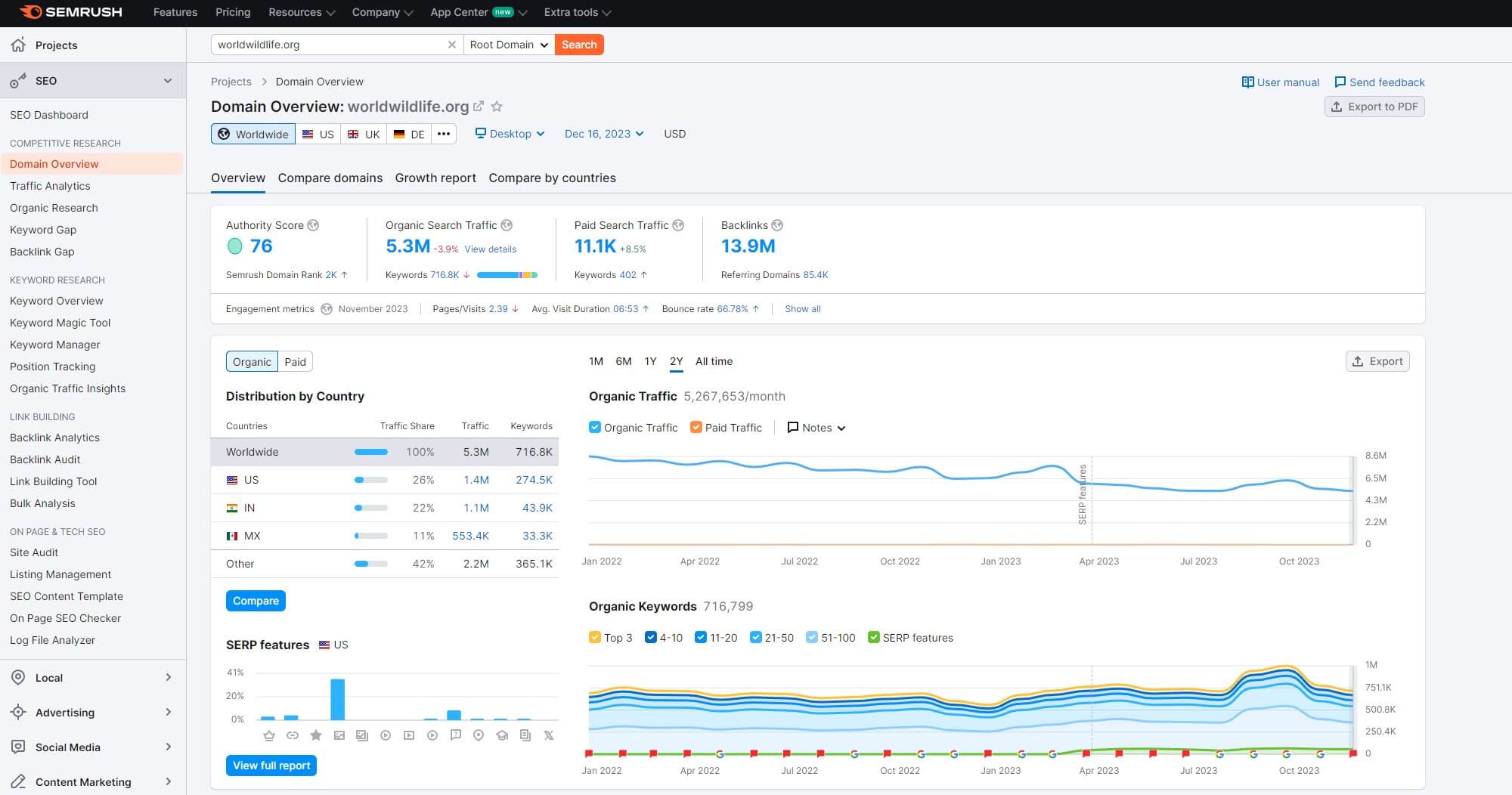
Semrush and Ahrefs will tell you more about the domain’s authority score, an estimated number of visitors, competitor domains, etc. Still, we noticed that Semrush provides a greater amount of information, one of which is search intent.
On the flip side, Ahrefs came out with a metric titled Value. It’s essentially the domain’s traffic value, which represents the amount of money you have to spend on ads monthly to have the same number of visits as the site in question.
Semrush will provide this information too, alas, in a separate menu called Organic Research. Thankfully, discovering this information isn’t a hassle thanks to Semrush’s amazing interface that lets you “slide” from menu to menu seamlessly.
Domain Analysis Accuracy
One feature found in Semrush and Ahrefs is the monthly traffic estimate. As you can guess, it displays the estimated monthly traffic to give you an overview of how many visitors you have. The downside is that these are estimates – not 100% accurate data.
What does this mean? Well, it means bigger sites produce more accurate results and vice versa. Less prominent domains with fewer visitors will make Ahrefs and Semrush way less accurate, whereas, popular domains will be analyzed with greater accuracy.
We like that Semrush is transparent, therefore, giving you the accuracy score right away. For example, if it “knows” the traffic analysis accuracy is lower, it’ll display two or one horizontal lines. Three horizontal lines mean the highest accuracy level.
When compared side by side, the accuracy of Ahrefs and Semrush is roughly equivalent. Not to mention they use comprehensive graphs that display traffic-related information vividly, so chances of missing something are non-existent.
Historical Data
Apart from getting data related to different platforms and countries regarding your SEO ranking, Ahrefs and Semrush support historical data. However, we think Semrush has an edge here because it can go way back.
We don’t like that Semrush requires a Guru plan for this feature. But if you have this plan, you can back to the start of 2012, which allows you to gather a load of information about a domain. Ahrefs can do the same but only as far as 2015, so there’s a 3-year gap.
Like Semrush, Ahrefs requires you to have a high-tier plan. To be precise, the Enterprise plan at almost $1,000 a month. That said, it’s unlikely you’ll have access to this information as a “normal” user. This makes Semrush a clear winner in this regard.
Its Guru plan is a speck under $209 a month, yet, offers historical data from more than a decade ago. We should also mention that Semrush-provided information is more comprehensive and easy to read, as it’s more graphics-oriented.
Site Authority Scores
The final domain research factor we want to reflect upon is the site authority score. Semrush or Ahrefs, who’s better here? The first shows the Authority Score, while the second provider comes with its Domain Rating Score.
Both are presented with a score from 0 to 100, reflecting the authority a specific domain has in the given niche. Semrush calculates the score based on the number of (estimated) traffic, spam score, and quality of backlinks.
Ahrefs relies on the latter – backlinks. We think Semrush is a bit more accurate in this regard given the fact that it takes more factors into account. Yet, Ahrefs’ site authority is typically a benchmark for many, as it turns out to be incredibly precise.
That’s why both are some of the top-rated SEO tools in 2025. Nevertheless, in the domain research category of the Ahrefs vs Semrush duel, the latter wins.
Keyword Research (Draw)
As we move on to keyword research, things become more difficult. We can say that Ahrefs and Semrush are reliable keyword research tools. Once you search for the keyword, they’ll display information like keyword difficulty, volume, domains that rank for that phrase, and so forth.
Semrush calls this Keyword Overview, while Ahrefs titles it Keywords Explorer. Rest assured, the features are akin, even showing you related keywords and questions that you can implement. Factors like global volume and CPC are here too.
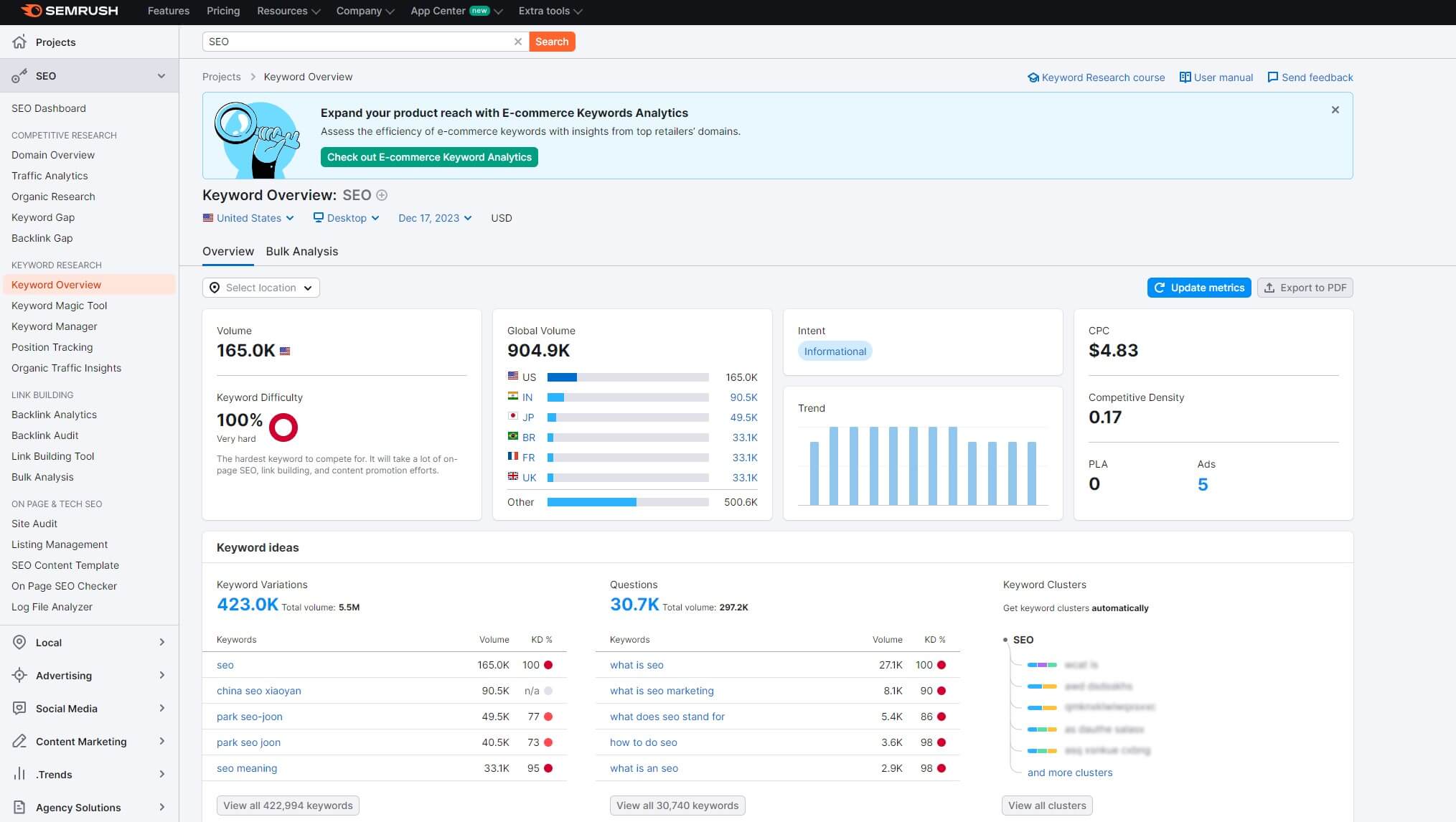
We like that both services use backlinks as a vital factor for determining the keyword difficulty. You’ll get suggestions on the number of backlinks you need to rank for a specific keyword in the top ten SERPs, for instance.
Albeit, we found Ahrefs to be slightly better, as it displays this number for all keywords. Semrush sometimes tends to be vague and does not show the precise number of backlinks you need. On rare occasions, it won’t show this parameter at all – but that’s very seldom.
Search Intent
In our Semrush vs Ahrefs duel, we like Semrush’s Search Intent. This is something you won’t find in Ahrefs, yet, we think it’s a valuable bit of information. It tells more about the user’s intention behind the search.
It can be informational, navigational, transactional, or commercial. Best of all, Search Intent is displayed when using the Keyword Magic Tool as well. When you analyze a specific keyword, Semrush displays related keywords, difficulty, volume, and search intent.
For example, if you want to sell a product, you’ll likely want to use a keyword marked with the green letter T, which means transactional. Sadly, you won’t find anything remotely similar in Ahrefs, which makes Semrush a winner so far.
Keyword Gap
What about keyword gaps? Well, both services offer it but with one stark difference.
Semrush calls it simply Keyword Gap, while Ahrefs titles it Content Gap. Both function the same. They let you discover the keywords that your competitors rank for but you don’t.
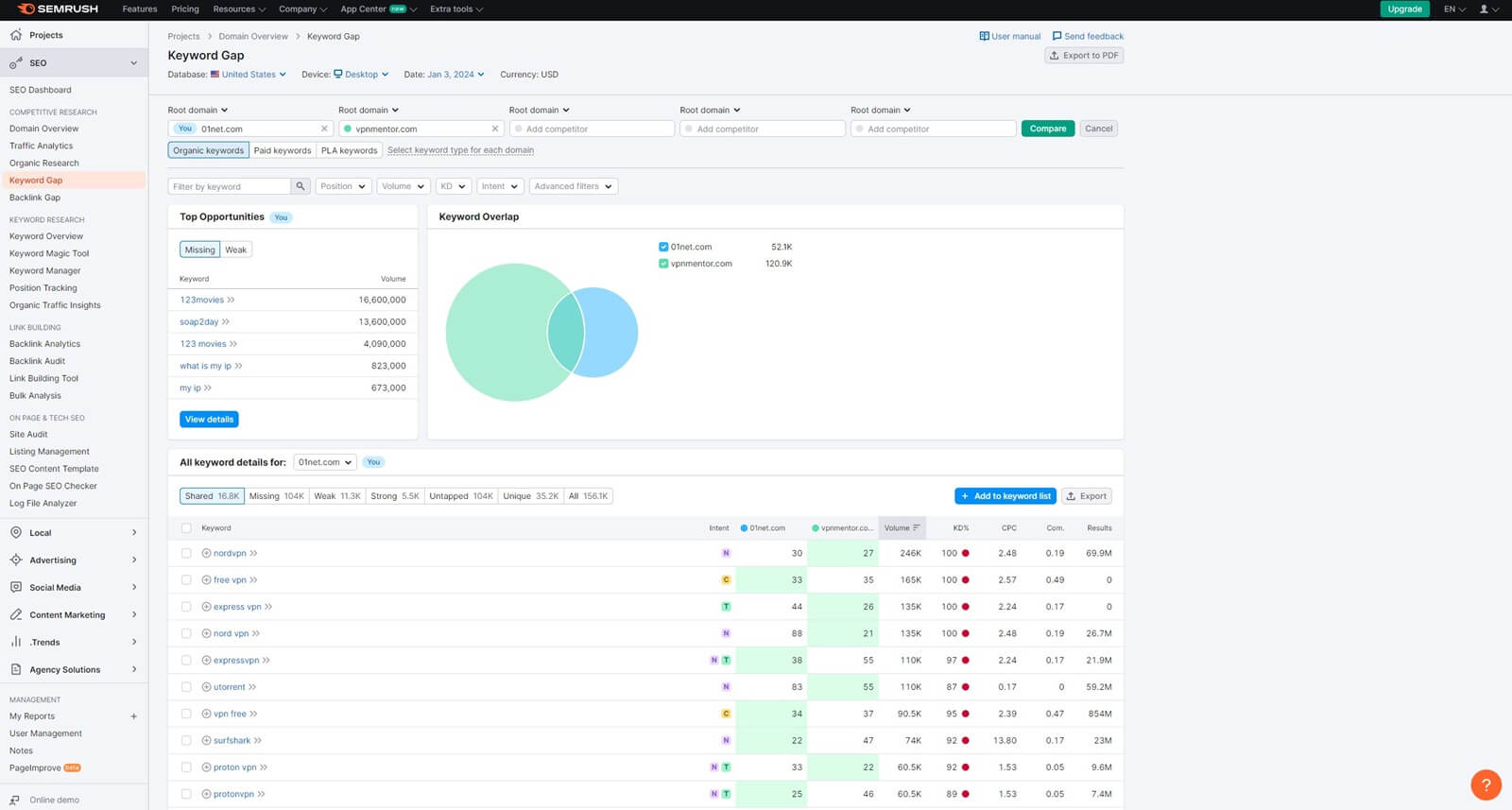
In return, you can fill this “gap” and implement these keywords to rank for them. Semrush allows you to compare your domain to four competitor domains – in total, 5 sites. Ahrefs is a lot better here, as it lets you evaluate your domain against TEN sites instead.
Topic/Keyword Clustering
Semrush offers a Keyword Manager tool, enabling you to group keywords into so-called clusters. Ahrefs can do the same with its Keyword List tool. In doing so, you can develop topical authority and thus, be rewarded by search engines with better ranking.
In our tests, both performed well, with a slight advantage for Ahrefs. When you provide the keywords, Semrush will come back with a mind map of related topics and keywords, some of which aren’t “properly” related to the subject matter.
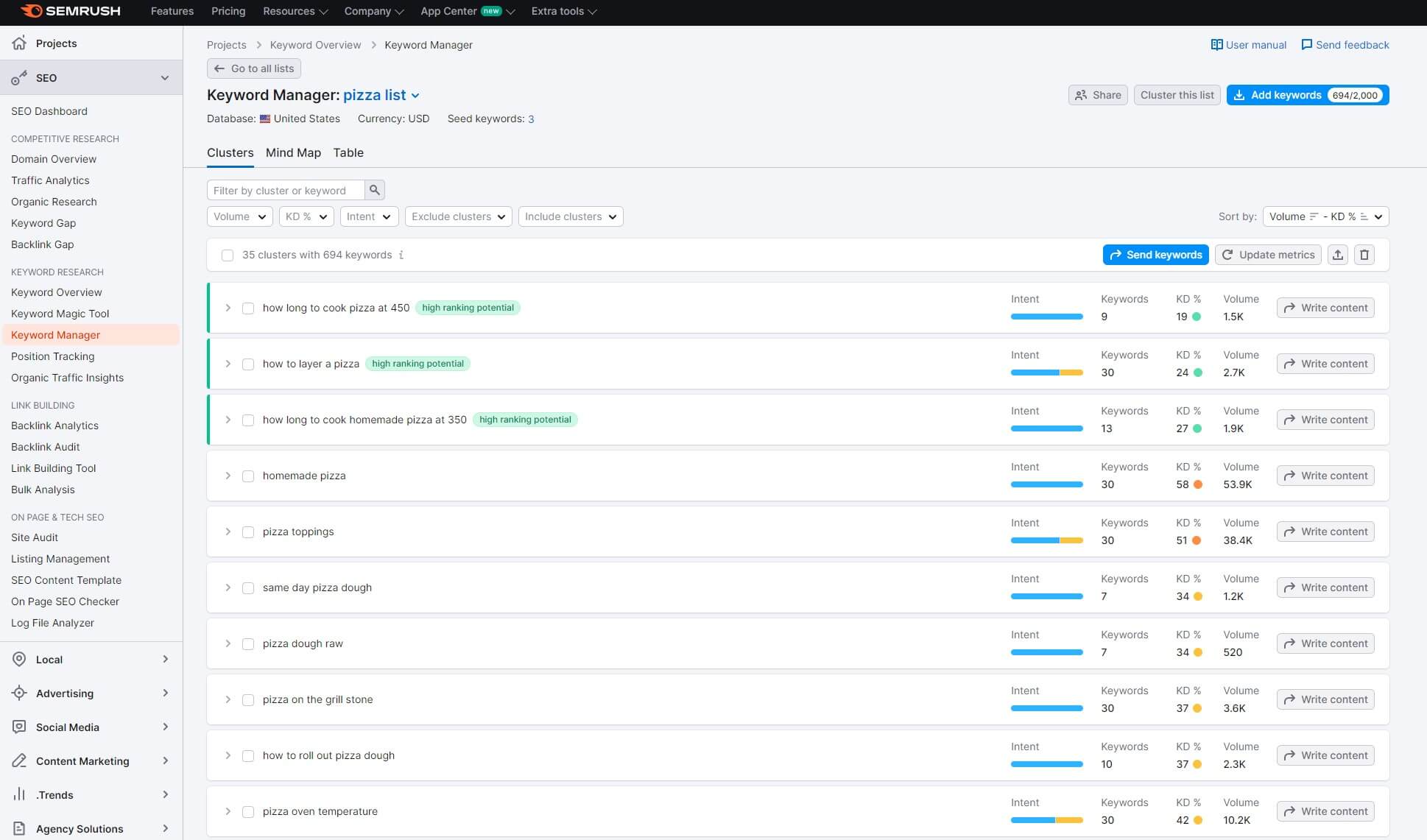
You sometimes have to dig around to find the right topics. Ahrefs seems to be more pragmatic in this regard. Also, in our testing, we found that it’s a bit more accurate, always trying to involve the keyword you provided in related topics/phrases.
That said, we think Ahrefs’ Keyword List is slightly better and more intuitive overall.
Rank Tracking
Rank tracking is one of Ahrefs’ weakest features if you ask us. It allows you to track your domain for a specific keyword or set of keywords. Semrush updates its ranking information daily, while Ahrefs does this WEEKLY – such a shame.
The good thing is that Ahrefs is slightly more generous. Its Lite plan tracks 750 keywords, while Semrush’s Pro plan can track 500. Before you say that Ahrefs is better, let us remind you of its new “Credits” system that we’ll discuss later in the Semrush vs Ahrefs duel.
You can get daily updates on ranking changes in this service too. Alas, you’re looking at an additional payment of $100 to $250 a MONTH only for this commodity. Frankly, it’s insulting how greedy this sounds, even though, admittedly, Ahrefs’ rank tracking is pretty accurate.
Read more about our favorite rank tracker SEO tools.
Supported Search Engines
In this Semrush vs Ahrefs duel, we prefer the latter’s selection of search engines. Semrush will optimize your website for Google – only for this search engine. We don’t blame it, as Google’s market share is around 90% compared to ALL other search engines.
Thus, you’ll find all of its data relevant only to Google. Ahrefs supports 9 search engines, which include Bing, Yahoo, Baidu, Seznam, Amazon, YouTube, and plenty more. The level of detail differs, however, as you’ll still get the most detailed reports for Google.
PPC Analysis
PPC analysis is a vital feature of both services and in this case, we have to give it to Semrush. Its PPC-related data is more in-depth and easier to acquire, thanks to the Advertising Research tool. All you have to do is enter the domain name and get information.
Semrush will include data like the number of keywords, estimated traffic, traffic cost, paid search positions, and so on. Ahrefs allows you to perform full-on ad research but in a smaller scope, showing only some bits of data.
You still get access to paid keywords, domain performance, average traffic, and a few more insights. Generally speaking, Semrush would be a superior choice if you want to boost your earnings through PPC, with Ahrefs following behind closely.
Having everything in mind, this part of our Ahrefs vs Semrush duel ends up in a draw. Semrush excels in PPC research, rank tracking, and the search intent function, while Ahrefs is better at search engine support, keyword/topic clustering, and the keyword gap tool.
Link Building/Backlink Analysis (Semrush Wins)
Backlink analysis is handy for determining your backlink profile, the number of backlinks, and discovering new backlink opportunities. This tool is essential and can be found in both services. However, it greatly depends on the number of links in the database.
We know Semrush has around 43 trillion but we’re sure the database expands daily to meet the ever-growing needs. Ahrefs has around 22 trillion internal and 35 trillion external links. At the time of writing, Semrush has nearly 810 million domains in its database, however.
Ahrefs has around 210 – more or less. In theory, it means Semrush should be able to provide more accurate backlink information than Ahrefs. This can easily be checked by the number of referring domains the tools would find for specific sites.
As expected, during our tests, Semrush won by displaying way more referring domains for the majority of websites. That’s only a part of the equation, as backlinks and link building contain a lot more quirks to analyze.
Backlink Audit
Backlink Audit is one of the best tools of Semrush. It’s here to analyze your backlink profile and report back on toxic, potentially toxic, and broken backlinks. We love that the tool explains how and why to fix the issue and prevent it from harming your ranking.
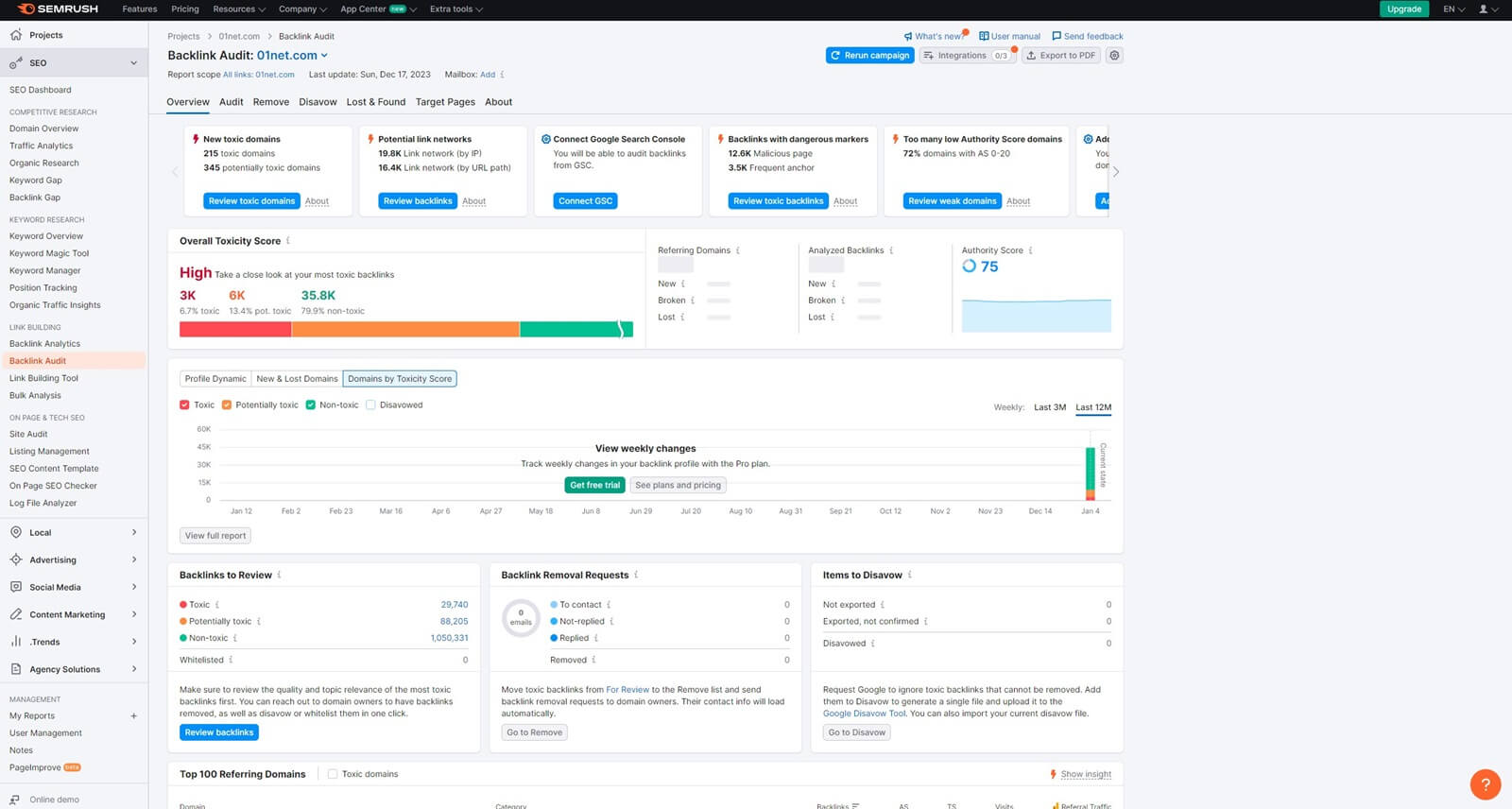
Another thing to mention is the Disavow tool. It allows you to import all toxic and broken links into a single file and send it to Google directly to ignore them. Semrush allows you to automatically remove such links by using the Remove tool.
Ahrefs offers nothing similar to this tool, making Semrush a winner.
Backlink Gap
Backlink Gap is an interesting tool of Ahrefs and Semrush. To be precise, it’s called Link Intersect in Ahrefs, allowing you to compare your and your competitor’s domain and see which websites link to its domain but not yours.
Again, you’ll find Ahrefs superior in this regard, as it provides more information about more websites. Like the Keyword Gap tool, Semrush can compare your domain to 4 more, while Ahrefs can do 10 – much better.
Link Building
Disappointingly for Ahrefs, Semrush’s link-building is superior. In fact, it’s among the best tools of this type on the market. By providing the domain name, you can discover a huge list of sites that you can request a backlink from.
Semrush deems these “Domain Prospects” and displays the URL type and its rating. Even better, you can reach out to the website owner and contact him/her through email directly from Semrush. This way, you can request a backlink or a guest post.
Semrush allows you to seamlessly cooperate with other websites and boost your SEO through quality backlinks. Ahrefs lacks this function, while its rival shines with the CRM-like link-building tool that screams intuitiveness and reliability.
That said, Semrush is a stellar Ahrefs alternative if you prioritize link building.
Site Auditing (Semrush Wins)
Site audit comes as standard, whether you’re using Ahrefs or Semrush. We like its focus on the technical side of things, as it helps to unveil slow-loading pages, keyword overuse, broken backlinks, duplicate content, and much more.
All of these problems negatively impact the domain’s ranking, so their removal is imperative. Semrush and Ahrefs will display the so-called health score from 0 to 100, with an accent on the most urgent errors that need immediate fixing.
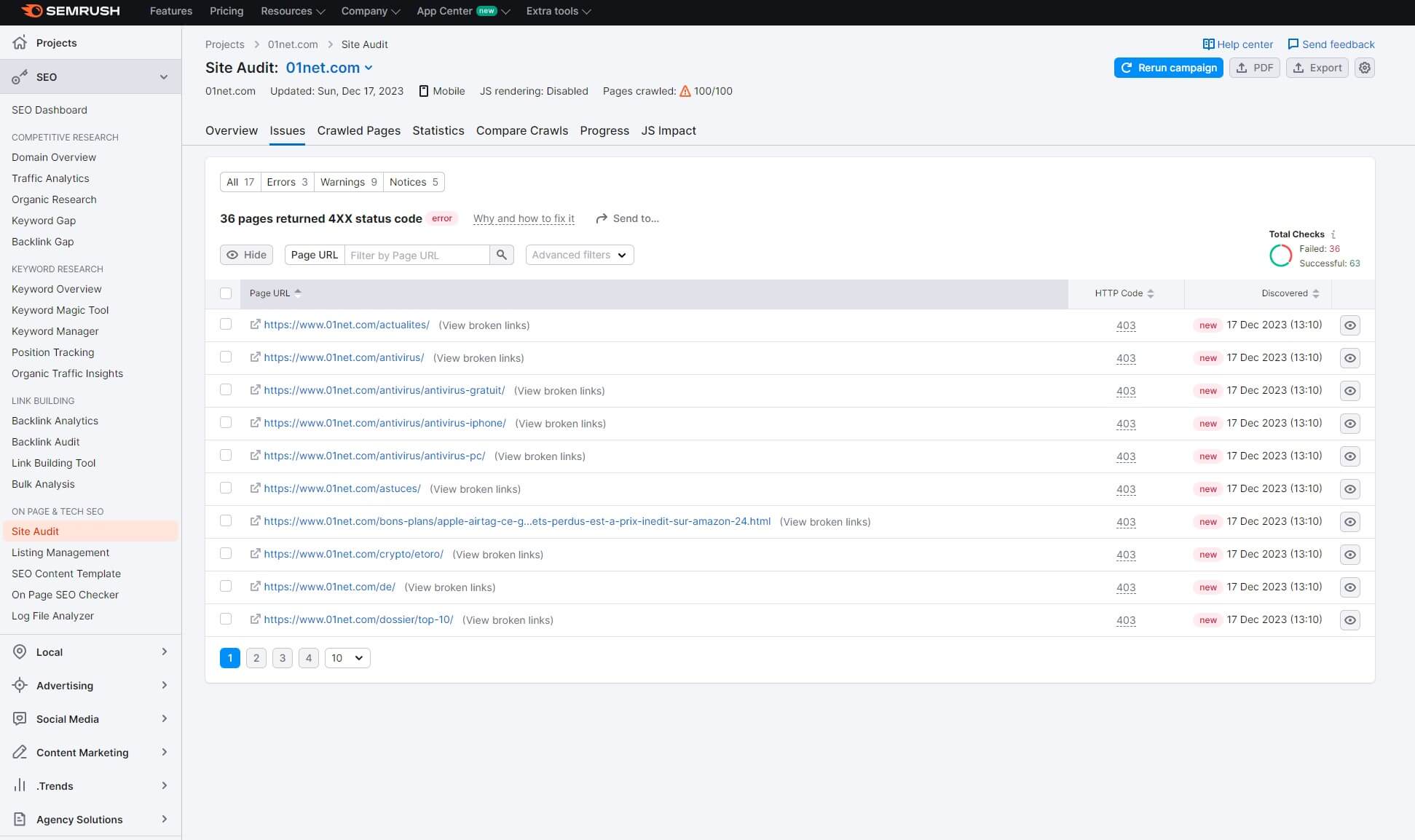
They’ll also come up with reasons for fixing them and explain thoroughly HOW to make them disappear. We like how detailed they are. Each issue is explained in several paragraphs with precise information on what to do – pretty nifty.
On-page SEO is better in Semrush than in Ahrefs. The service promptly goes through all your pages and advises improvements for each page according to their priority. You can be advised to add/remove content, provide a meta description, improve keyword optimization, or something else.
Ahrefs’ equivalent is more vague, so to speak. It’ll advise improvements but is more technical. This means you won’t get suggestions for content quality improvements as you’d do in Semrush. In General, we think Semrush is superior to Ahrefs for site auditing.
One thing to note is that both tools fetch the Core Web Vitals parameters from Google Lighthouse, so they’re accurate. Again, Semrush offers an edge in terms of the ability to send SEO tasks to members of your team via Trello, Semrush CRM, or Zapier.
If you have an SEO specialist doing optimization for you, this person can be assigned a task to remove the issue outlined by Semrush. Ahrefs doesn’t support this feature.
Content Marketing (Semrush Wins)
Semrush is equipped with a bunch of Content Marketing tools. In particular, we’re talking about Topic Research, which allows you to find new content ideas for the given phrase or keyword. Another handy tool is the SEO Writing Assistant.
Here, you can analyze the text from your page and let Semrush advise optimizations. It’ll grade the text according to originality, readability, SEO optimization, and tone. Moreover, it’ll also display targeted and recommended keywords to include in the text.
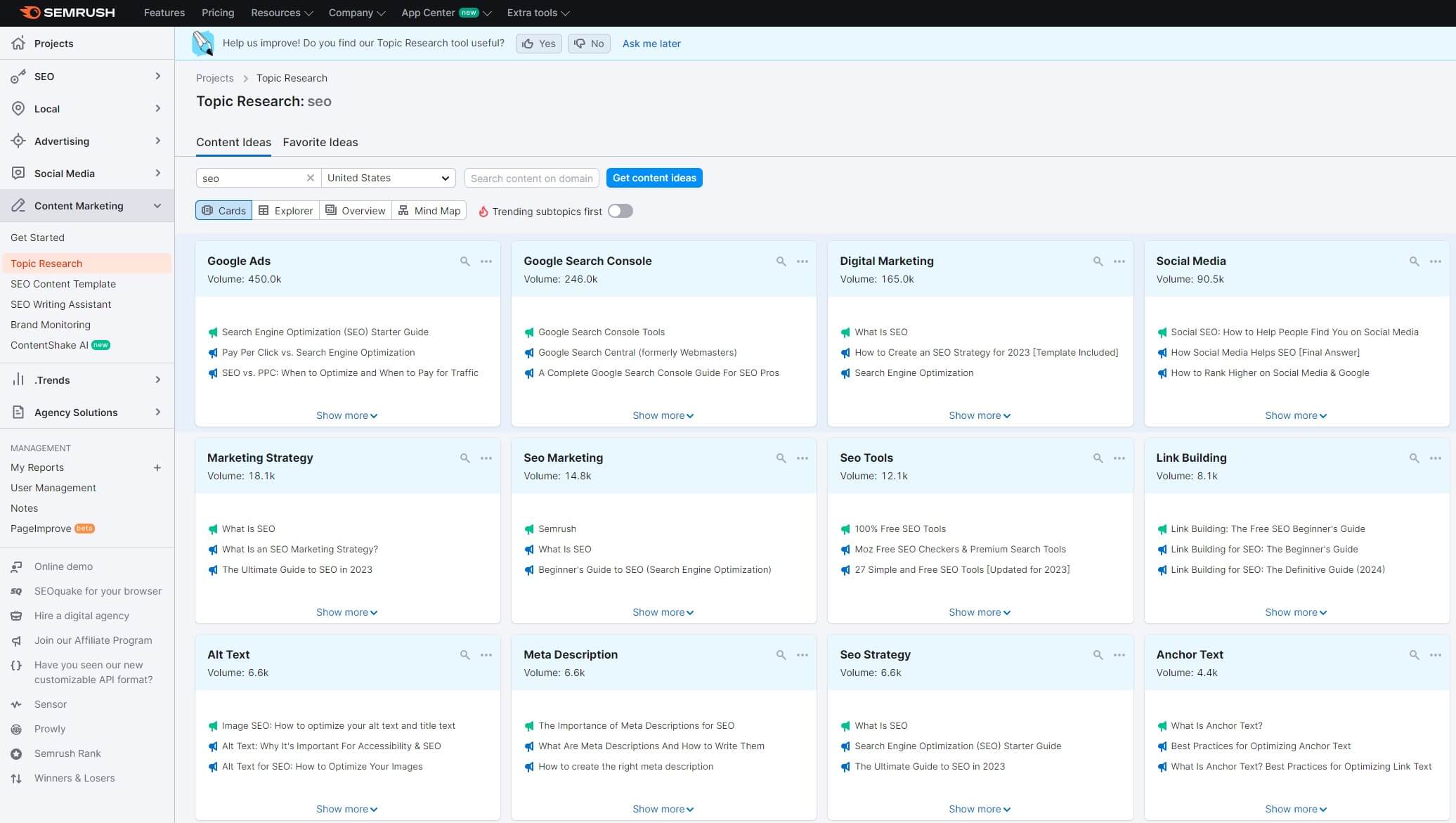
We also like Semrush’s SEO Content Template option. The tool will display key recommendations in the form of backlinks, text length, and semantically related keywords based on the provided group of keywords.
There’s the ability to order content writing through the AI tool, which is, unfortunately, a paid addition. Ahrefs boasts nothing akin, although there’s the Content Explorer option that you can use. It’ll tell you more about the popularity of a topic and show the domains that rank the best for it – nothing more.
As for AI writing, Ahrefs offers no such thing. We can say the same about Moz Pro which is inferior to Semrush in this segment. Semrush’s AI writer is stellar – not the best – but it’s a paid addition.
Perhaps it’s smart to get ContentShake AI that can write unlimited articles and provide 25 content ideas weekly for $60 a month. ContentShake AI comes with a free trial PLUS a free plan, so it’s worth checking out.
Other Features (Semrush Wins)
When discussing other features, it’s good to know that Ahrefs offers very few of them. In fact, in our Ahrefs vs Semrush comparison, we prefer the latter. Ahrefs comes with the option to buy additional credits, keywords to track, and user seats – bog-standard stuff.
However, Semrush opens up a whole App Center where you can find 30+ apps to expand your SEO capabilities. Granted, these apps are usually paid, with only a couple of free offers, such as Plagiarism Checker, Email Verifier, and Semrush Persona.
The App Center is home to apps regarding:
- Keyword research
- Advertising
- Web design
- Social media
- AI apps
- Content creation, and much more…
Not to mention add-ons like Semrush Local, Semrush .Trends, Agency Growth Kit, and ImpactHero, yet another AI tool. We discussed all of them in our review of this service, so we won’t go too deep into them. One thing is clear – Ahrefs has no equivalents.
Ahrefs vs Semrush: Ease of Use (Draw)
Ease of use is important for getting around the interface swiftly and obtaining the required info. We’ll admit that Semrush and Ahrefs are hands down among the best options in this regard. While Moz looks a bit dated, Ahrefs and Semrush are quite modern.
Semrush is more graphic, which we prefer. Its colorful graphs are amazing at divulging relevant information but Ahrefs isn’t a slouch. Its way of showing data is a bit different and you’ll be greeted by more “raw” information instead.
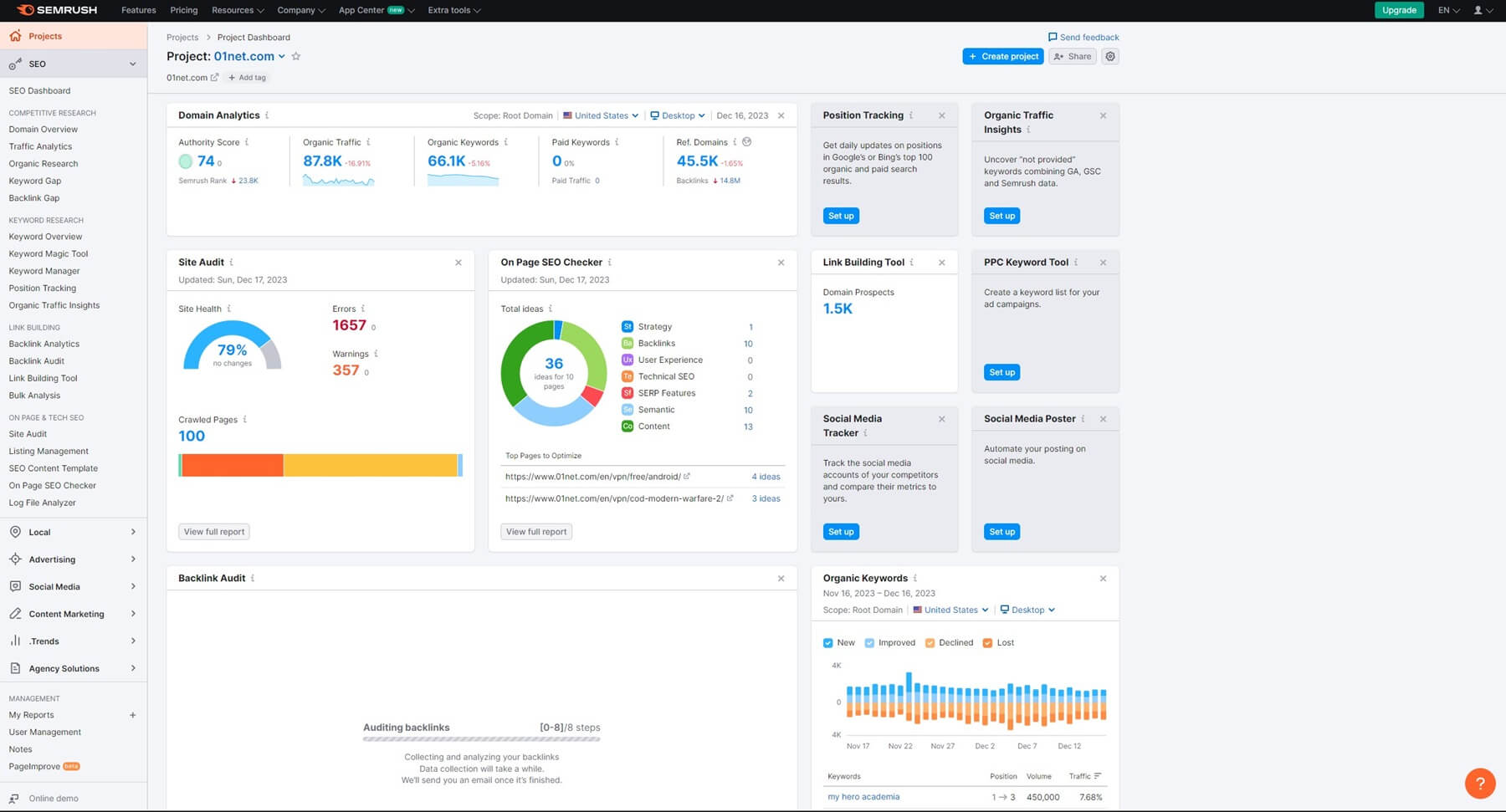
However, on a few occasions, we found Ahrefs a bit more intuitive and coherent. On the flip side, Semrush excels in performance and feels a bit snappier than its rival. This is noticeable in loading times, which tend to be shorter in Semrush.
Ahrefs and its analysis of larger domains can be painfully slow at times when its rival shines. Some say you have to dig a bit more in Semrush to get additional information, and while that’s true for some cases, we don’t agree.
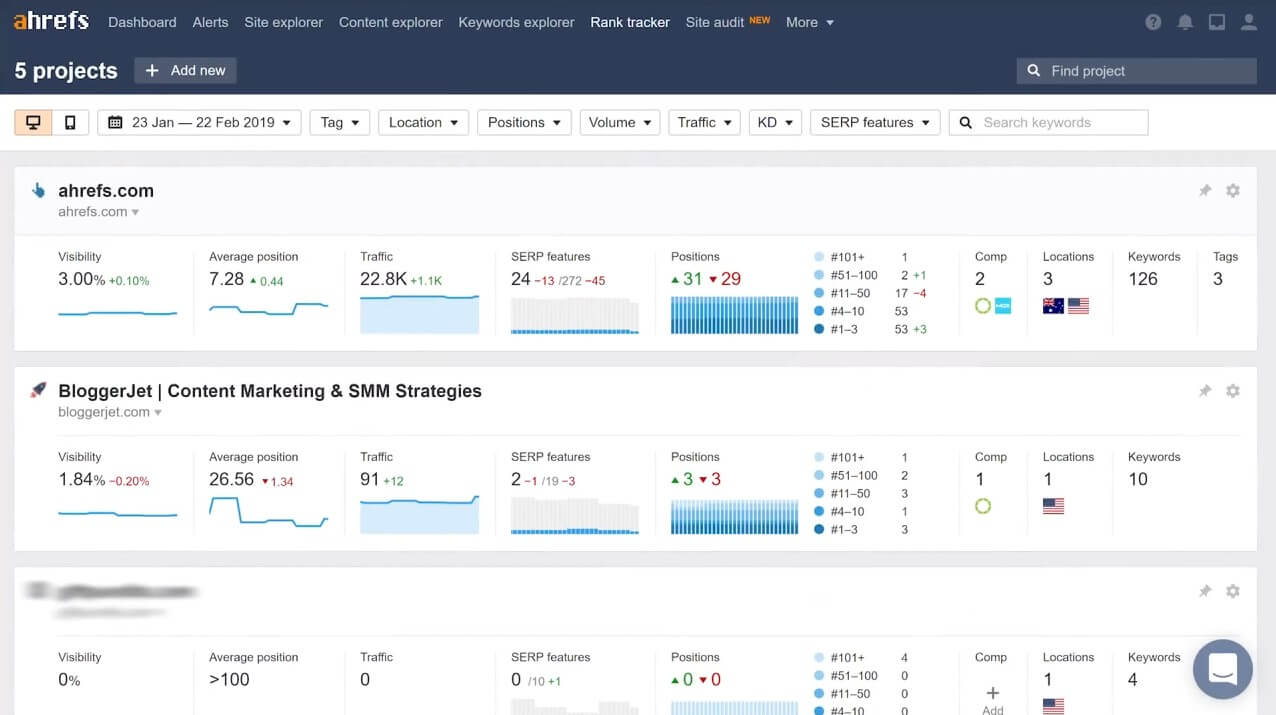
Besides, this service is more informative overall and because it comes back at you with more data, it instinctively seems more complex. Aesthetics-wise, Semrush wins but in terms of practicality and intuitiveness, we’d say it’s a draw.
Their mobile counterparts are not particularly great. Semrush has a mobile app with rank-tracking functionality and Ahrefs has none. Therefore, you’ll be forced to use it in your mobile browser, which will in both cases be an unpleasant experience.
Semrush vs Ahrefs Price Comparison (Semrush Wins)
Premium tools like these often cost a top dollar. We won’t lie – Ahrefs and Semrush are far from the cheapest and if you want to get the most out of them, you’ll indeed have to pay a lot. If you’re interested, we have a special article about Semrush alternatives that you can try.
However, we assure you you’d be better off with this service than with any other. But let us not get in the way of your decision. Instead, let’s see how affordable both services are since you’re likely in doubt about which one to get.
Semrush
Semrush’s pricing structure is straightforward. It offers monthly and annual plans and the latter are 17% cheaper. First, let’s look at its monthly plans:
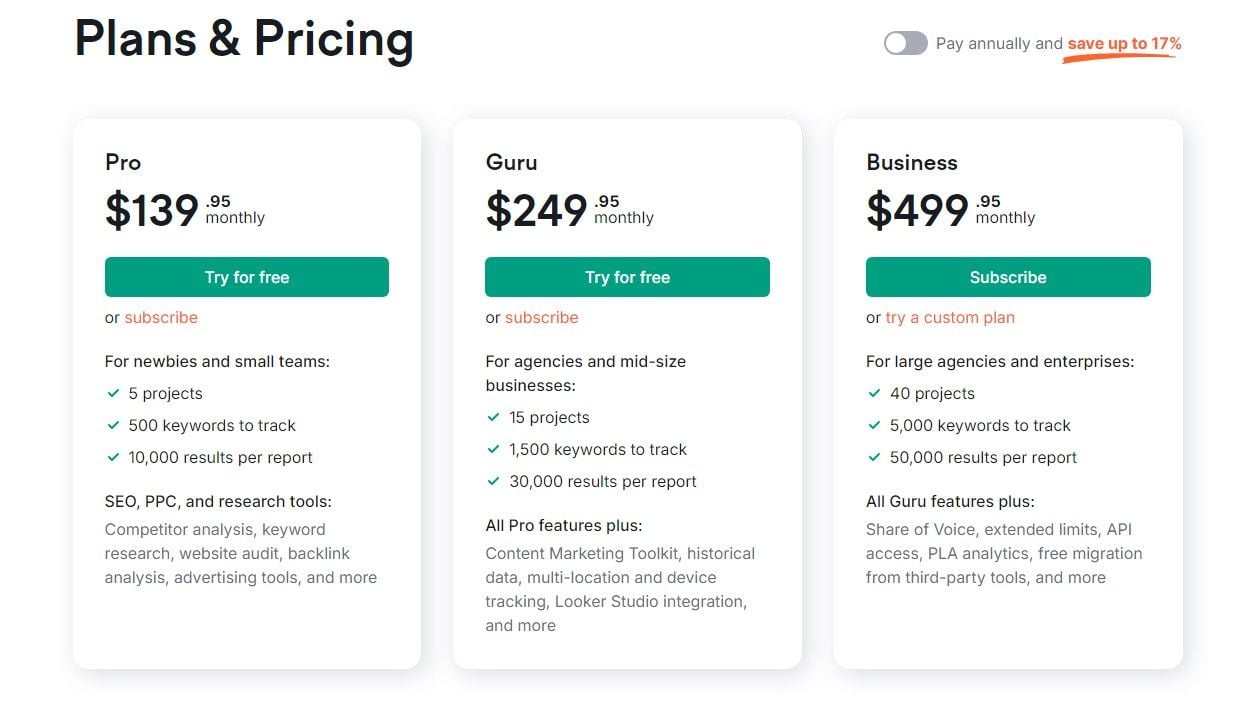
The Pro plan at under $140 is a solid deal, allowing for 5 projects, 500 keywords to track, and 10,000 results per report. While the plan is amazing, we still recommend the Guru plan, which ups the number of projects to 15 and keywords to track to 1,500.
This plan includes Content Marketing, whereas, the Pro plan doesn’t. Conversely, you’ll find its price of $249.95 a month a bit expensive. There’s the Business plan with 40 projects, 5,000 keywords to track, and 50,000 results per report among other features.
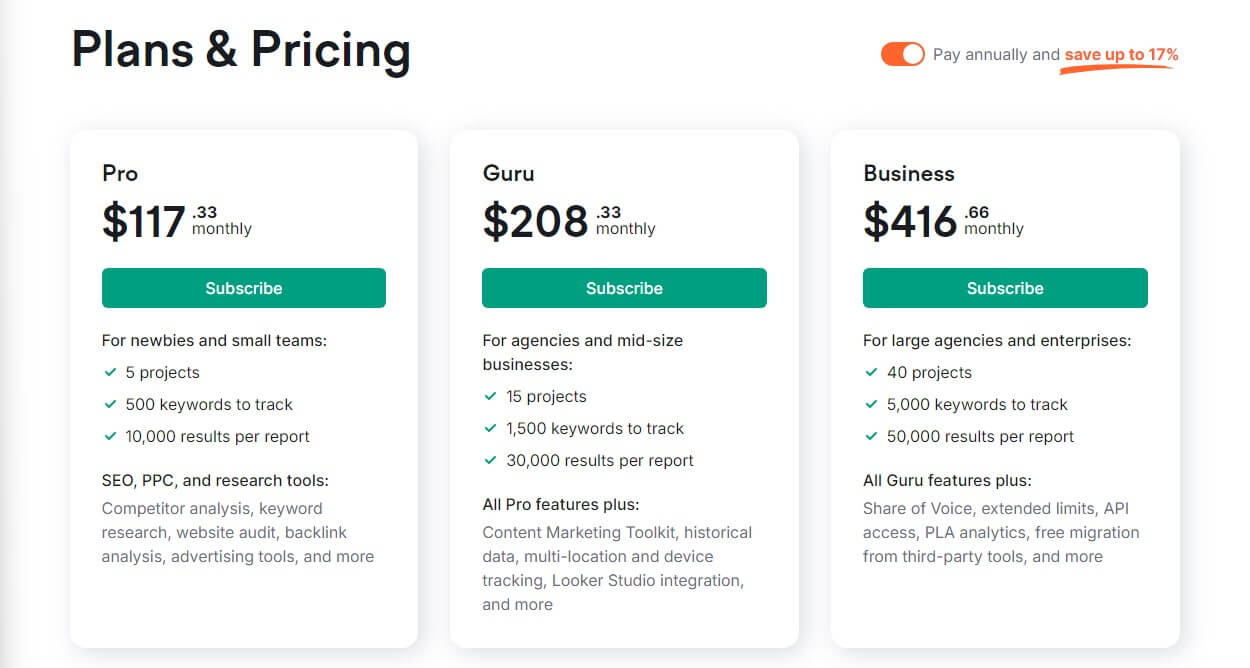
The HUGE downside is that all plans are made for a single person – even the Business plan. Yes, you can pay a lower price by paying for one year upfront, as shown above, but you’ll have to pay for additional user seats.
For example, Pro plan users will pay $45 per seat on top, while Guru and Business plan users will pay $80 and $100 per month respectively. There’s a great incentive in the form of a 14-day trial plus a 7-day refund policy on all plans.
See how to get a trial on Semrush on our site and start your free trial if you’re interested. Generally speaking, it’s not the most affordable but we assure you its quality justifies the price. For full information about its add-on prices, use the button below.
Ahrefs
Okay, so Ahrefs is, at first, cheaper than Semrush, but it’s really not the case.
The new pricing structure includes the “Credits” system and Ahrefs increased its base price from $99 to $108 a month for the monthly plan, much to users’ dismay.
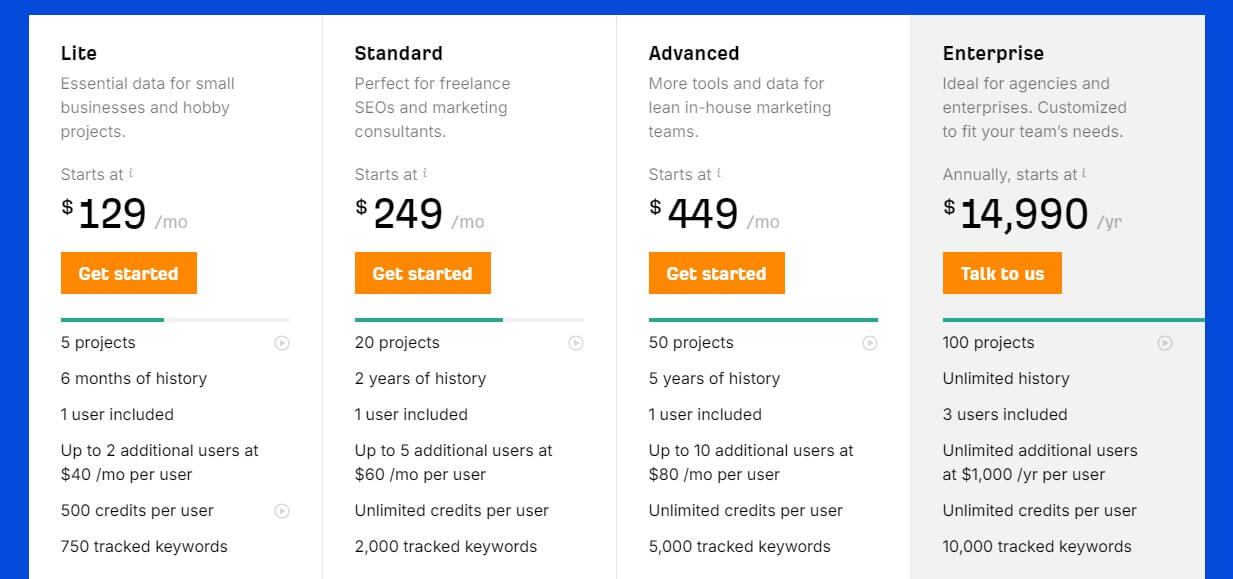
Either way, the Standard plan costs $249 a month and offers 2,000 keywords to track, with unlimited site audits, 2 years of historical data, and other tidbits. Then, we have the Advanced plan with 5,000 tracked keywords, which costs $449 a month.
For us, the silliest plan is the Enterprise one at a whopping $14,990 a year, which is way more than any Semrush plan. Heck, even if you equip Semrush with almost ALL of the bonus add-ons, you won’t end up paying that much even in the Business plan.
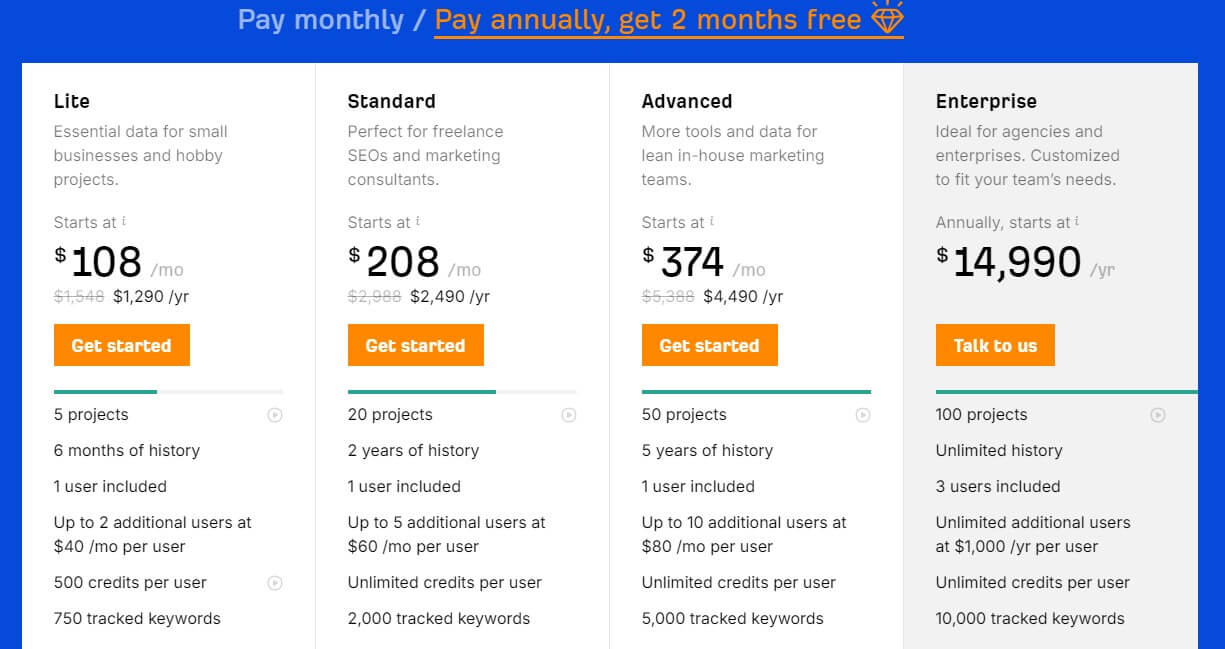
Users who opt for annual payments will get 2 free months and the discounts you see above. These prices are much more acceptable, especially for the Lite plan. But now, we get to the credits that are essential to use Ahrefs.
You’ll need those for EVERY action. For example, even opening a simple report costs 1 credit, so if you spend all, you can top your account up with more credits, which, as you can guess, costs more. $35 a month for 500 credits, to be precise.
The more you use Ahrefs, the more you pay, so it’s a way of Ahrefs to motivate you to use it more – sarcasm. This system infuriated many of its users who started using Semrush instead, or even paying less by choosing SE Ranking.
Not to mention that Ahrefs has NO free trial, which is a serious downside. It’s like the company wants to dwindle the number of users instead of getting more of them. We don’t say the service is bad – far from it.
But it’s extremely expensive to the point of questioning whether it’s truly worth the price.
Which One Is a Better Free SEO Tool? (Semrush Wins)
Ahrefs or Semrush, which is a better free SEO tool? We have to give this one to Semrush. It has a fully fleshed-out free plan with a wealth of features. Every feature we mentioned in this duel is available for free users but with limits.
Even site audits can be performed in addition to keyword/domain research, backlink analysis, and so much more. Ahrefs has no free plan – another annoying thing. It, however, offers a few free tools that you can use without registration.
The Keyword Generator is particularly interesting, as well as the Keyword Difficulty Checker. We also like the YouTube Keyword Tool to help you get more views, as well as SERP Checker, Backlink Checker, and a few more.
No doubt, Ahrefs has a solid selection of free tools, even some you wouldn’t expect, like AI Writing Tools that can perform a variety of content-optimization operations. The company is generous on the non-paid front but not as Semrush.
There’s no domain analysis, site audits, backlink audits, and so on. That said, Semrush is indeed a better SEO tool usable for free.
Customer Support of Semrush and Ahrefs (Draw)
Customer support isn’t the most important part of this duel. Yet, if you need to get in touch, it’s good to have live chat and email support, which both companies have. Semrush offers phone support unlike Ahrefs, which could be an advantage.
However, we rarely use phone support because of sometimes long waiting times. We instead prefer a live chat service that we can contact at any time. Ahrefs and Semrush are quick to answer, although their support teams don’t seem to be working 24/7.
During our Semrush vs Ahrefs testing, we enjoyed their support teams and had no issues getting in touch.
The Final Verdict: Semrush Wins Against Ahrefs
After our extensive Ahrefs vs Semrush comparison for 2025, the conclusion is that Semrush wins over Ahrefs. No doubt, we’re discussing the very best products that the SEO tool market has to offer. Semrush didn’t win by a giant margin, though.
Arhefs, in many instances, is better than Semrush, especially in the number of supported search engines, keyword clustering, the number of tracked keywords, and a few more. On the other hand, Semrush beats its opponent in the amount of information it provides.
Generally, it’s more informative, better looking, and with more unique metrics, such as search intent and various PPC data. Site audits are better in Semrush and there’s a hot 14-day free trial with an excellent FREE plan that Ahrefs doesn’t offer.
We shouldn’t put aside Ahrefs’ credits that can be annoying and expensive in the long run. Semrush, despite not being as affordable as SE Ranking, wins against Ahrefs in the value round. On the larger plan, Semrush is a better choice overall and our recommended pick.
Don’t forget about its 14-day free trial that can be used to evaluate the service personally. Or maybe, you can use SE Ranking without paying the same way and end up paying less for an almost equally impressive SEO tool.